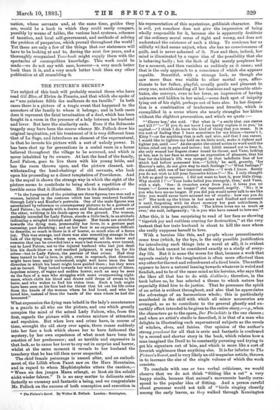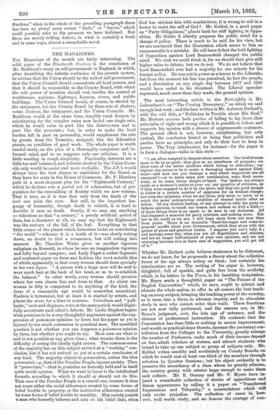THE PICTURE'S SECRET.*
THE subject of this book will probably remind those who have read Gil Bias, of Elvira de Pinares, and that which she spoke of as "une peinture fidele des malheurs de ma famine." In both
cases there is a picture of a tragic event that happened to the ancestors of the family to whom it belongs; and in both cases does it represent the fatal termination of a duel, which has been fought in a room in the presence of a lady between her husband and lover. Bat here the similarity ends. Even if the Belmonte
tragedy may have been the source whence Mr. Pollock drew his original inspiration, yet his treatment of it is very different from
that of Le Sage, and introduces an element of the supernatural, in that he invests his picture with a sort of unholy power. It has been shut up for generations in a sealed room in a house believed throughout the village to be accursed, and which is never inhabited by its owners. At last the head of the family, Lord Falcon, goes to live there with his young bride, and has the room thrown open, and the picture cleaned, not- withstanding the head-shakings of old servants, who look upon his proceeding as a direct temptation of Providence. And in the sequel is shown the strange way in which the sight of the picture seems to contribute to bring about a repetition of the terrible scene that it illustrates. Here is its description :—
" In the foreground of the painting are three figures, two men and a woman, habited in the costume which has been rendered familiar through Lely's and Kneller's portraits. One of the male figures was ascertained by reference to contemporary pictures to be a portrait of Lord Falcon ; he stands with a drawn and blood-stained sword over the other, writhing in his death-agony on the ground. The woman, probably intended for Lady Falcon, stands a little back, in an attitude indicating a mingled triumph and despair. Her hands are stretched towards the dying man, presumably her lover, in a gesture part caressing, part shrinking ; and on her face is an expression difficult to describe, so much is there in it of horror, so mach also of a fierce joy. This was strange, and there was also something strange in the look of the dying man, whose eyes, expressing all the terror and remorse that can be crowded into a man's last moments, were turned, not to Lord Falcon, not to the injured husband who had just dealt Kim his death-blow—a well-merited judgment, it may be, for his crime—but to Lady Falcon, the partner of that crime. Had they been turned to her in love, in pity, even in reproach, that direction might have been easily understood, might well have been the last direction in which his heart might have guided them ; bat they were not so turned. They looked towards her with an expression of bitter, ■ hopeless misery, of vague and sadden horror, such as may be seen on the face of a man who struggles with some overpowering night- mare, which chills his blood and draws cold drops of sweat to his brow' and who wakes to find his vision true. Such a look might have been seen on his face had the thrust that let out his life come from the hands of the woman wbem he bad loved, and who had loved him, instead of from the hands of the man whom he had dis- honoured."
What expression the dying man beheld in the lady's countenance is a puzzle to all who see the picture, and one which greatly occupies the mind of the actual Lady Falcon, who, from the first, regards the picture with a curious mixture of attraction and repulsion. But when love and crime have, in course of time, wrought the old story over again, there comes suddenly into her face a look which shows her to have fathomed the mystery, by her own experience of what must have been the emotion of her predecessor; and so terrible and expressive is that look, as to cause her lover to cry out in surprise and horror, whilst at the same moment it reveals to her husband the treachery that he has till then never suspected.
The chief female personage is named after, and an embodi- ment of, the Lilith whom Faust saw on the Harz Mountains, and in regard to whom Mephistopheles utters the caution,— " Wenn sie den juugen Mann erlangt, so litsst sie ihn sobald nicht wieder fahren." It is no easy matter to delineate satis- factorily so uncanny and fantastic a being, and we congratulate Mr. Pollock on the success of both conception and execution in
• The Picture's Secret. By Walter B. Pollock. London : Remington.
his representation of this mysterious, goblinish character. She is evil, yet somehow does not give the impression of being wholly responsible for it, because she is apparently destitute of the ordinary moral sense of right and wrong, and does not understand the existence of such a thing. To condemn her as wilfully wi3ked seems unjust, when she has no consciousness of guilt, and is never ashamed of it. Now and then, indeed, her mind is illuminated by a vague idea of the possibility that she is behaving badly ; but the flash of light merely perplexes her for a moment, and then vanishes as suddenly as it came; and that is the only approach to a conscience of which she appears capable. Beautiful, with a strange look, as though she saw more than was visible to other mortal eyes, affec-
tionate to her father, playful, usually gentle and pleasant to every one, notwithstanding all her feminine and agreeable attri- butes, she conveys, even to her lover, an impression of having unknown evil hidden in her mind,—some dark spot of iniquity lying out of his sight, perhaps out of hers also. In her disposi- tion is a combination of tenderness and ferocity, which is
exemplified in a scene where she nearly strangles her kitten without the slightest provocation, and which we quote :—
" Clever boy,' she said. I But what is "a smile that can caress and kill ?" If you do not know I can hardly explain it to you,' he replied.—' I think I do know the kind of thing that you mean. It is the sort of feeling that I have sometimes for my kitten—haven't I, Kitty ?—or for anything that is soft and nice, and that I can OtiXeSs. I would like to tighten my hold on its little neck, make it tighter and tighter yet, until —' As she spoke she gaited action to word until the kitten cried out in pain and terror ; but Lilith seemed not to hear it, she only wound her fingers closer round its throat, and Vane, looking at her, saw in her face so strange an expression of pleasure, that his fear for the kitten's life was merged in that indefinite fear of her which had before possessed him.—' Lilith,' he said, gravely, for Heaven's sake, do not give way to such feelings !'—' What feelings ?' she asked, with one of her innocent smiles.—' I wish I knew. Surely you do not wish to kill your favourite kitten ?'—' No. I only thought it felt so good to squeeze. I did not want to hurt it, poor little thing. Why should I ?'—' Your looks belied you strangely, then,' said Vane, with a sigh. See : it crouches away from you ; it loves you no longer.'—' Loves me no longer ?' she repeated, angrily. 'No; it is you who love me no longer. If you did you would never talk to me like this : you would never have accused me of cruelty : how can you do so ?' She took up the kitten in her arms and fondled and caressed it until, forgetting with its short memory her past unkindness, it purred with responsive gratitude. The kitten loves me as much as ever,' she said, indignantly ; 'it is you who have ceased to love me.'"
After this, it is less surprising to read of her face as showing "tigerish joy and ruthless craving for destruction," at the very instant that her irate husband is about to kill the man whom she really supposes herself to love.
With a heroine like this, and pe3ple whose presentiments come true (which, by the bye, is the only possible justification
for introducing such things into a novel at all), it is evident that the book cannot be considered exactly as a study of every- day life. But it is none the worse for that, because a work that appeals mainly to the imagination is often more effectual than any other for the rest and refreshment of a tired brain. The author appears to have a natural leaning towards whatever is weird and fiendish, and to be of the same mind as his heroine, who says that she likes all that has to do with diablerie; therefore, in the book before us, he has selected a theme to which nature has especially fitted him to do justice. That he possesses the spirit of an artist is evident throughout, and also that he appre3iates the advantage of an harmonious whole; this is particularly manifested in the skill with which all minor accessories are arranged, so as to contribute to the general ghostly and un-
earthly effect intended to be given to the entire story,—e.g., when
the characters go to the opera, Der l'reischiitz is the one chosen ; and when an artist's studio is described, it is that of a man who delights in illustrating such supernatural subjects as the revels of witches, elves, and fairies. Our opinion of the author's strong penchant for all that is eerie and fantastic is confirmed by a second and shorter story in the book, which relates how a
man imagined the Devil to be constantly pursuing and trying to get his signature out of him, and which is more like a sort of
feverish nightmare than anything else. It is far inferior to The Picture's Secret, and is very likely an old magazine article, thrown
in to increase the size of the single volume of which the work consists.
To conclude with one or two verbal criticisms, we would
observe that we do not think "flitting like a cat" a very happy simile, because that animal's movements hardly corre- spond to the popular idea of flitting. And a person careful about grammar would not talk of "birds singing cheerily among the early leaves, as they walked through Kensington
Gardens," when in the whole of the preceding paragraph there has been no plural noun except "birds," or "leaves," which could possibly refer to the pronoun we have italicised. But these are merely trifling defects, in what is certainly a fresh and in some ways, almost a remarkable novel.



































 Previous page
Previous page